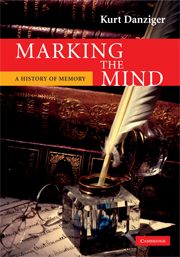8 - A place for memory
Published online by Cambridge University Press: 05 June 2012
Summary
Where is memory?
Unlike some other capabilities of the human soul, memory has been assigned its own place in the body for a very long time. Aristotle believed it resided in the heart, but a medical tradition systematized by Galen located it in the brain. This tradition, which dominated European medical speculation for well over a thousand years, located the powers of the soul in the ventricles, conceptualized as chambers of the brain filled with fluid. Three such ventricles were commonly distinguished, located in the front, middle and back of the brain respectively. Memory was regularly allocated to the posterior ventricle. Whereas medieval Christian authorities tended to favour a location in a cavity of the brain, the Arabic–Aristotelian tradition allowed that memory's place might be in the brain tissue.
Physicians had cause to reflect on the powers of memory, not only because of the role it played in their own training and practice, but also because they were occasionally faced with cases of memory failure that seemed to be associated with disease or physical injury. In his Natural History Pliny the Elder, for example, mentions the case of a man struck by a stone who forgot how to read and write but nothing else, and another who fell from a high roof and forgot his mother, relatives and friends. If one already thinks of memories as inscriptions it is easy to accept that these inscriptions are locatable in some specific part or parts of the body.
- Type
- Chapter
- Information
- Marking the MindA History of Memory, pp. 222 - 242Publisher: Cambridge University PressPrint publication year: 2008



